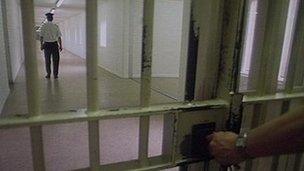Prisoners will pay for damage repairs, says Grayling
- Published

There were 6,881 proven cases of wilful damage in jails in 2012
Inmates who cause damage to prisons and prison property will now have to pay for the cost of repairs, the justice secretary has announced.
Chris Grayling said the taxpayer has had to foot the bill for "offenders' malicious acts" for too long.
The new policy, which covers all jails and young offender institutions in England and Wales, will be introduced on 1 November.
Mr Grayling said his "next task" would be to look at early release rules.
The new plans will give governors of public sector prisons and directors of privately managed prisons the power to take the money directly from the prison accounts of those responsible for damage.
Prison accounts usually contain money earned by inmates in prison - typically £4 per week for jobs such as laundry - and money sent from friends and family for treats such as cigarettes, according to the Ministry of Justice (MoJ).
There were 6,881 proven cases of wilful damage in jails in 2012. That included 411 offences of setting fire to property and 6,470 of destroying or damaging property.
Currently a prisoner makes no contribution to the repairs - such as the £1,000 cost of replacing a complete toilet and sink unit and plumbing, the £832 cost for a new cell door, or up to £419 for a new window - or the cost of labour.
'Financially accountable'
Under the new plans, if an offender is found guilty of an offence involving the damage or destruction of prisons or prison property, an adjudicator will impose an award to recover money from the prisoner for the damage caused.
They will also be able to decide on an appropriate punishment for an offender's behaviour. This could include loss of privileges or cell confinement.
The compensation will be for the full value of the damage caused - up to a maximum of £2,000 - unless there are sufficiently compelling circumstances to make a lesser award.
The MoJ says inmates will be left with £5 in their accounts to purchase necessary items and maintain contact with their family.
The debts will last for a maximum of two years or until a prisoner's sentence expiry date.
Justice Secretary Chris Grayling said: "It is clearly not right that prisoners can wilfully cause damage in prisons and not be held financially accountable.
"For too long the hard-working taxpayer has had to foot the bill for offenders' malicious acts, and this cannot continue.
"From now on, if you wilfully break it you will pay for it."
Andrew Neilson, director of campaigns at the Howard League for Penal Reform said he wondered whether Mr Grayling was "anticipating and pre-empting discontent in prisons" after budget cuts.
He said there were practical issues with prisoners paying for repairs, as it was unlikely they would ever have the money to pay the full costs.
Plans would also have to be "very carefully implemented" to ensure that vulnerable prisoners were not made more vulnerable, he added.
"A great deal of damage is done in cells by vulnerable people in acts of self-harm or suicide attempts so it would not be appropriate to fine them as it might lead to more distress, and further self-harm," he said.
Meanwhile, speaking at the Conservative conference in Manchester, the justice secretary said he "didn't like concept of automatic early release".
"I don't like the idea that from the off, a serious offender knows he's only going to serve half his sentence. Looking at that issue is my next task," he said.